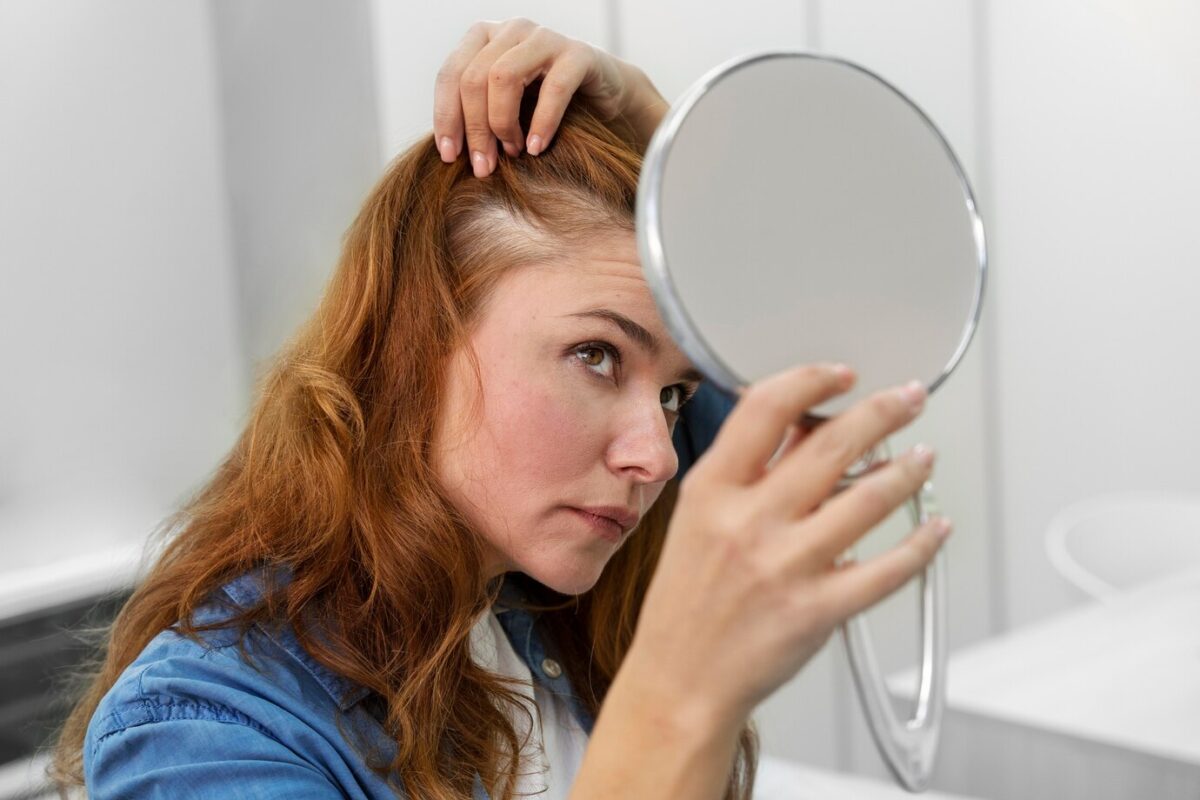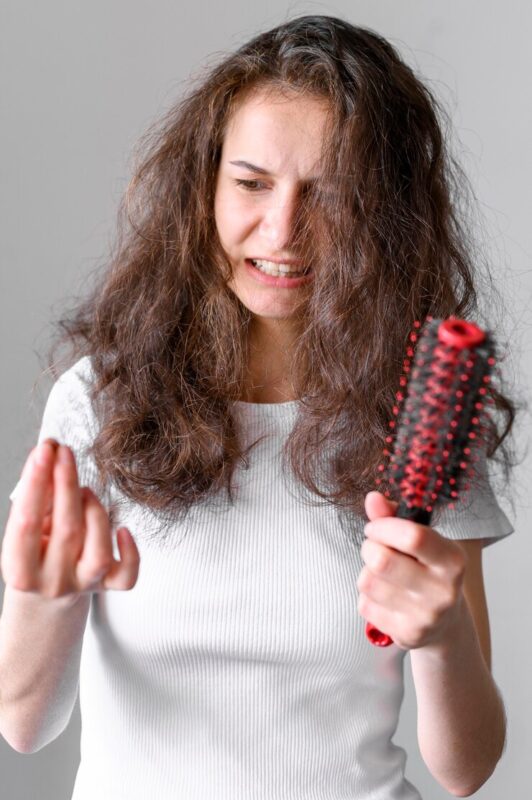Hair Loss Prevention

Hair loss, also known as alopecia, can occur for various reasons and can affect both men and women. Some common causes of hair loss include:
- Genetics: The most common cause of hair loss is hereditary hair loss, also known as androgenetic alopecia. This type of hair loss is more common in men, where it’s often referred to as male pattern baldness, but it can also affect women.
- Гормональные изменения: Hormonal changes due to pregnancy, childbirth, menopause, or thyroid disorders can contribute to hair loss.
- Medical Conditions: Certain medical conditions such as alopecia areata (an autoimmune disorder that causes patchy hair loss), scalp infections, and trichotillomania (a psychological disorder characterized by the urge to pull out hair) can lead to hair loss.
- Лекарства: Some medications, including chemotherapy drugs, blood thinners, antidepressants, and medications for high blood pressure or heart disease, can cause hair loss as a side effect.
- Stress: Physical or emotional stress can lead to temporary hair loss called telogen effluvium. Stressful events such as surgery, illness, or significant weight loss can trigger this type of hair loss.
- Nutritional Deficiencies: Inadequate intake of certain nutrients such as iron, protein, vitamins (especially B vitamins), and minerals like zinc can lead to hair loss.
- Age: Hair loss is a natural part of aging for many people. As we age, hair follicles may shrink and produce thinner and shorter hair, leading to overall hair thinning.
- Traction Alopecia: Constant pulling or tension on the hair follicles, often due to hairstyles like tight braids, ponytails, or hair extensions, can cause hair loss over time.
Treatment for hair loss depends on the underlying cause. It’s essential to consult a dermatologist or healthcare professional for an accurate diagnosis and appropriate treatment plan. Treatment options may include medications, topical treatments, hormone therapy, lifestyle changes, or procedures such as hair transplants. Early intervention is crucial for managing hair loss effectively.
Preventing hair loss involves a combination of lifestyle changes, proper hair care, and, in some cases, medical treatments. Here are some strategies to help prevent hair loss:
- Здоровая диета: Eating a balanced diet rich in vitamins, minerals, and protein is essential for maintaining healthy hair. Foods high in protein, iron, omega-3 fatty acids, vitamins A and C, and biotin can promote hair health.
- Scalp Care: Keep your scalp clean and healthy by regularly washing your hair with a mild shampoo. Avoid using harsh chemicals and excessive heat styling, as they can damage the hair and scalp.
- Gentle Hair Handling: Treat your hair gently to prevent breakage and damage. Avoid tight hairstyles that pull on the hair, and use a wide-tooth comb or your fingers to detangle wet hair.
- Stress Management: Chronic stress can contribute to hair loss, so practice stress-reduction techniques such as meditation, yoga, deep breathing exercises, or regular exercise.
- Avoid Smoking and Excessive Alcohol: Both smoking and excessive alcohol consumption can contribute to hair loss, so it’s best to avoid or minimize these habits.
- Limit Hair Treatments: Over-processing hair with chemical treatments like bleaching, perming, or straightening can weaken the hair and lead to breakage and hair loss. Limit these treatments and give your hair time to recover between sessions.
Certain food supplements may help support overall hair health and potentially reduce hair loss, especially when deficiencies in specific nutrients contribute to the problem. However, it’s essential to remember that supplements should not replace a balanced diet, and their effectiveness can vary depending on the individual and the underlying cause of hair loss. Here are some supplements that are commonly associated with promoting hair health and reducing hair loss:
- Biotin: Also known as vitamin B7, biotin is essential for the production of keratin, a protein that makes up the structure of hair. Biotin supplements are often taken to support hair growth and prevent hair thinning.
- Iron: Iron deficiency, known as anemia, can contribute to hair loss. Supplementing with iron may help improve hair health in individuals with iron deficiency anemia.
- Цинк: Zinc plays a role in hair tissue growth and repair. Low levels of zinc have been linked to hair loss, so supplementing with zinc may help support healthy hair growth.
- Витамин D: Adequate vitamin D levels are important for hair follicle cycling and hair growth. Supplementing with vitamin D may be beneficial for individuals with vitamin D deficiency.
- Омега-3 жирные кислоты: Omega-3 fatty acids, found in fatty fish, flaxseeds, and walnuts, have anti-inflammatory properties that may help reduce hair loss and promote hair growth.
- Protein: Hair is made up of protein, so ensuring an adequate intake of protein in the diet is essential for healthy hair growth. Protein supplements, such as whey protein or collagen peptides, may be beneficial for individuals with low protein intake.
- Витамин Е: Vitamin E is an antioxidant that may help reduce oxidative stress on the scalp and promote hair growth. Supplementing with vitamin E may be beneficial for some individuals with hair loss.
- Silica: Silica is a mineral that is important for maintaining the strength and elasticity of hair. Supplementing with silica may help support hair health and reduce hair breakage.

The plants with the most evidence-based effect against alopecia are Curcuma aeruginosa (pink and blue ginger), Serenoa repens (palmetto), Cucurbita pepo (pumpkin), Trifolium pratense (red clover), and Panax ginseng (Chinese red ginseng).
Herbal treatments for hair loss have been used for centuries in traditional medicine systems around the world. While scientific evidence supporting the effectiveness of herbal remedies for hair loss is often limited, some herbs have shown promising results in promoting hair growth and reducing hair loss. Here are some herbal treatments commonly used for hair loss:
- Rosemary: Rosemary oil has been traditionally used to stimulate hair growth and improve scalp health. It may help increase circulation to the scalp, which can promote hair growth.
- Peppermint: Peppermint oil has a cooling effect on the scalp and may help improve blood circulation, thereby promoting hair growth. It also has antimicrobial properties that can help maintain a healthy scalp.
- Lavender: Lavender oil is known for its calming and soothing properties, but it may also help promote hair growth by improving blood circulation to the scalp and supporting hair follicles.
- Saw Palmetto: Saw palmetto extract is commonly used as a natural remedy for hair loss, particularly in men with androgenetic alopecia (male pattern baldness). It may help block the production of dihydrotestosterone (DHT), a hormone that contributes to hair loss.
- Женьшень: Ginseng has been used in traditional medicine for its adaptogenic and hair-stimulating properties. It may help promote hair growth by improving blood circulation to the scalp and stimulating hair follicles.
- Aloe Vera: Aloe vera gel has soothing and moisturizing properties that can help maintain a healthy scalp. It may also promote hair growth and reduce scalp inflammation.
- Onion: Onion juice is rich in sulfur, which is believed to promote hair growth and improve hair thickness. Some studies suggest that applying onion juice to the scalp may help stimulate hair growth in people with alopecia areata.
- Amla (Indian Gooseberry): Amla is rich in antioxidants and vitamin C, which can help strengthen hair follicles and promote healthy hair growth. It may also help prevent premature graying of hair.
- Hibiscus: Hibiscus flowers contain vitamins and antioxidants that can help nourish the scalp and promote hair growth. Hibiscus extract or oil may help strengthen hair, prevent breakage, and reduce hair loss.

While herbal treatments may offer potential benefits for hair health, it’s essential to use them with caution and consult with a healthcare professional before starting any new treatment regimen, especially if you have underlying health conditions or are taking medications. Additionally, individual responses to herbal remedies can vary, so it’s important to monitor your scalp and hair health for any adverse reactions.
Gasmi A, Mujawdiya PK, Beley N, Shanaida M, Lysiuk R, Lenchyk L, Noor S, Muhammad A, Strus O, Piscopo S, Komisarenko A, Fedorovska M, Bjørklund G. Natural Compounds Used for Treating Hair Loss. Curr Pharm Des. 2023;29(16):1231-1244. doi: 10.2174/1381612829666230505100147. PMID: 37151166.
Zgonc Škulj A, Poljšak N, Kočevar Glavač N, Kreft S. Herbal preparations for the treatment of hair loss. Arch Dermatol Res. 2020 Aug;312(6):395-406. doi: 10.1007/s00403-019-02003-x. Epub 2019 Nov 3. PMID: 31680216.









